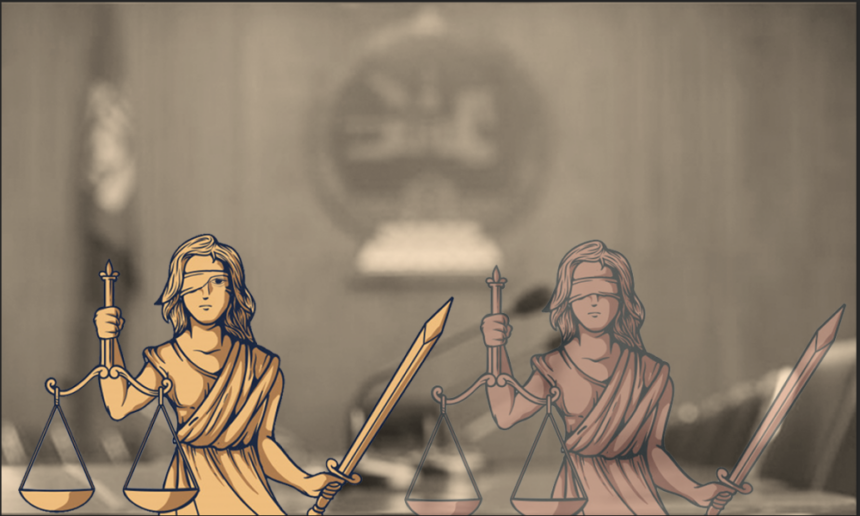“As a judge, I respect the virtuous duty of the judiciary, the constitutional order of Mongolia, human rights, freedoms, justice, and the rule of law. I shall resolve cases and disputes independently and only in accordance with the Constitution of Mongolia and other laws; I swear to my people that I will uphold the ethics of the judgeship. If I break my oath, I will immediately resign as a judge and be held accountable under the law”. Oath of the judge (Law on the Legal Status of Judges, March 7, 2012)
Every judge takes the oath of office as a judge. However, not all judges fulfill their oaths. Judges themselves have been involved in corruption, crime, and drug trafficking. The courts made it a habit to not resolve cases of corruption involving the officials by exceeding the duration of investigation; the defendants are either freed from penalties, allowed to repay the damages, or acquittal from the case. A special anti-corruption agency was established just ten years ago. Nonetheless, according to the Corruption Perceptions Index, Mongolia is not moving forward, but only backwards.
In the run-up to the 2020 elections, the number of court hearings has increased dramatically, and fast-paced sentencing had begun. What does the accelerated pace of the court proceedings mean? The appointments of the judgeship depend on the President. Perhaps the President Kh.Battulga has suddenly remembered his promise in his action plan to respect human rights and uphold justice which reads “…if proven to be involved in cases of corruption and bribery, offshore accounts, conflict of interest, one should be punished severely, dismissed and pay off the damages”. The next thing we know, three years have been passed and the next election will take place very soon. Could he be re-elected? If people ask about the promises, what will be the answer? These questions seem to have hastened the President, and as an effect, the judges. There is no guarantee that the MPP leadership did not influence the resolution of these cases as well. If so, have our judges, who vowed to be independent of anyone, become dependent from the authorities?
Court and elections
In the run-up to the 2020 parliamentary elections and during the campaign, several high-ranking governmental officials were sentenced to many years in prison. Those include members of parliament and government, as well as three prime ministers and heads of large state-owned companies. All cases were related to large mining projects, such as Oyu Tolgoi and Tavan Tolgoi. Initially, these large projects had become a distinctive tool for Mongolian politicians. For many years, decision-makers and contractors, who were involved in launching and implementing these projects, have been frequently reported in the media for abuse of the office and taking bribes.
The public has been waiting for a long time for a Mongolian court to resolve these cases, in which many were investigated, arrested and released. However, the hasty resolution of these cases during the election campaign raises doubts as to whether these complied with politically motivated orders.
After the election, a new parliament was formed. Three former members of parliament (G.Soltan was sentenced for 3 years, B.Batzorig was fined for 40 million MNT, B.Undarmaa sentenced for 2.6 years, D. Damba-Ochir sentenced for 3.6 years) who received soft loans from the SME Support Fund have been convicted. The re-elected members for the parliament (G.Zandanshatar, G.Temuulen, N.Uchral, B.Saranchimeg, B.Battumur, Kh.Bolorchuluun, B.Enkh-Amgalan, B.Javkhlan) did not even appear in front of the court and are exercising legislative powers. As soon as one becomes a member of the Parliament, he/she acquires the inviolable immunity protected by law. Many of the convicts (N.Nomtoibayar, J.Erdenebat, S.Bayartsogt, Da.Ganbold, B.Byambasaikhan) ran for the parliamentary election. They were detained until the end of the election campaign because ultra-large sums of money (2-10 billion MNT) were demanded as bail. J.Erdenebat was a member of the Parliament, imprisoned during his candidacy campaign, and was re-elected to the Parliament during his imprisonment, has so far become the only member of the Parliament who was imprisoned. Has our Parliament become a refuge chamber?
Miraculous court
Corruption is an act of using a high-ranking position in the government to gain wealth and money for private interests. Even if a corrupt official did otherwise good deeds for the public, he/she should be held accountable. Therefore, citizens have a good understanding about court decisions on specific corruption cases.
However, it is unclear why the ones who complied with the decisions made especially by the higher decision-making instances, such as of the Parliament and the Government and acted in accordance with his/her official duties, is being accused. It was said that B.Byambasaikhan and Da.Ganbold have reduced billions in tax revenue of the country. Why did the government make decision and then single them out for the agreement that the Prime Minister was standing by for signature?
In addition, the former Prime Minister M.Enkhsaikhan’s case was created on the grounds of sabotage and misuse of his power (CC: 22.1.1) to create advantageous position for others in the context of the Tavan Tolgoi agreement (CC: 19.6). After several years of litigation, the prosecution eventually turned into a case of causing harm using his power and position (CC: 22.1.2). The charge was altered and went from pushing a contract to be signed for a mega project, straight into buying a car for 130 million MNT when it was worth 75 million MNT. He was sentenced to 4.6 years in prison.
Currently, “49 percent of Erdenet mining” case is in due process. Society is watching closely and waiting for the resolution. A case which has been politicized over the years- how politicized will the court’s resolution be?
Justice
These cases show that Mongolian law does not apply equally to everyone. The judiciary continues to accommodate the law for pleasing the authorities only. As a result, the masses are seeking power and, once in a position of power, they fight to gain control over the judiciary.
In the last ten years, we talked about having a judiciary that stands regardless of who is in power. For this purpose, even the Constitution was amended. The Judicial Package comes next to be amended. Besides government, the President has drafted his own version of the law. How justice is served, depends on how this law will get passed. It also depends on whether interference on the judiciary from the executive can be prevented. This should categorically block the executive branch, the National Security Council, from having any influence on the judiciary.
2020.08.19
Trans. by Riya.T and Sungerel.U












